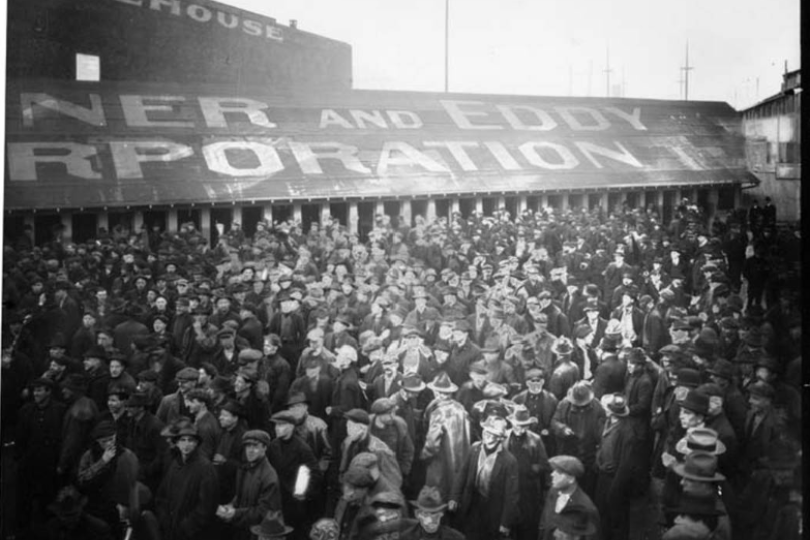During the Seattle General Strike of 1919, the Boilermakers played a crucial role as one of the participating unions. Labor unrest soaked the nation during and after World War I but the government and commerce wouldn’t raise pay for war-worn workers. The general strike of 1919 was the first general strike of any size in U.S. history. The objective was to demonstrate massive yet peaceful solidarity to change the tenor and balance of labor relations. And it all started at the shipyard.
During the war, the Emergency Fleet Corporation imposed strict wage controls nationwide. To support the war, shipyard workers kept working while getting paid much less than they were worth. After the war, they demanded a 20% raise, or $1 more an hour, but owners and federal regulators refused their demand. So, shipyard workers walked off the job. Some workers, including the Boilermakers, didn’t have approval from their union leadership to strike.
The Seattle Central Labor Council called for a general strike in support of the shipyard workers near the end of January, and workers from “telephone girls” to carpenters to maids complied. Estimates put the number of union workers striking at around 65,000 with a total of around 100,000 workers walking off their jobs.
Union members formed the General Strike Committee, a council of representatives from the different unions involved in the strike. This committee was responsible for coordinating activities, organizing support and ensuring the strike remained peaceful and well-disciplined.
Throughout the strike’s duration, union members managed the city’s essential services, ensuring that hospitals, food distribution centers and public utilities continued to function with minimal disruption. Unarmed union members patrolled the street to keep the peace. This display of responsible and disciplined action demonstrated that the striking workers were not seeking chaos but rather advocating for their rights and improved working conditions.
The strike showcased the influence of organized labor and the power of solidarity among diverse worker groups. The Boilermakers, alongside their fellow union members, contributed to the strike’s peaceful and orderly nature, dispelling fears of radicalism and violence that were often used to discredit labor movements.
In the end, while the Seattle General Strike only lasted five days, it left an enduring impact on the labor movement in the United States. When the general strike ended, Samuel Gompers of the American Federation of Labor was elated and proclaimed the “revolution was over.” Because not everyone in the labor movement supported the strike.
The actions of the Boilermakers and other participating unions demonstrated the potential for collective action and peaceful protest, influencing future labor movements and inspiring workers to continue fighting for their rights. The Boilermakers’ role in the strike serves as a reminder of the importance of worker solidarity and the quest for a more equitable and just society.






